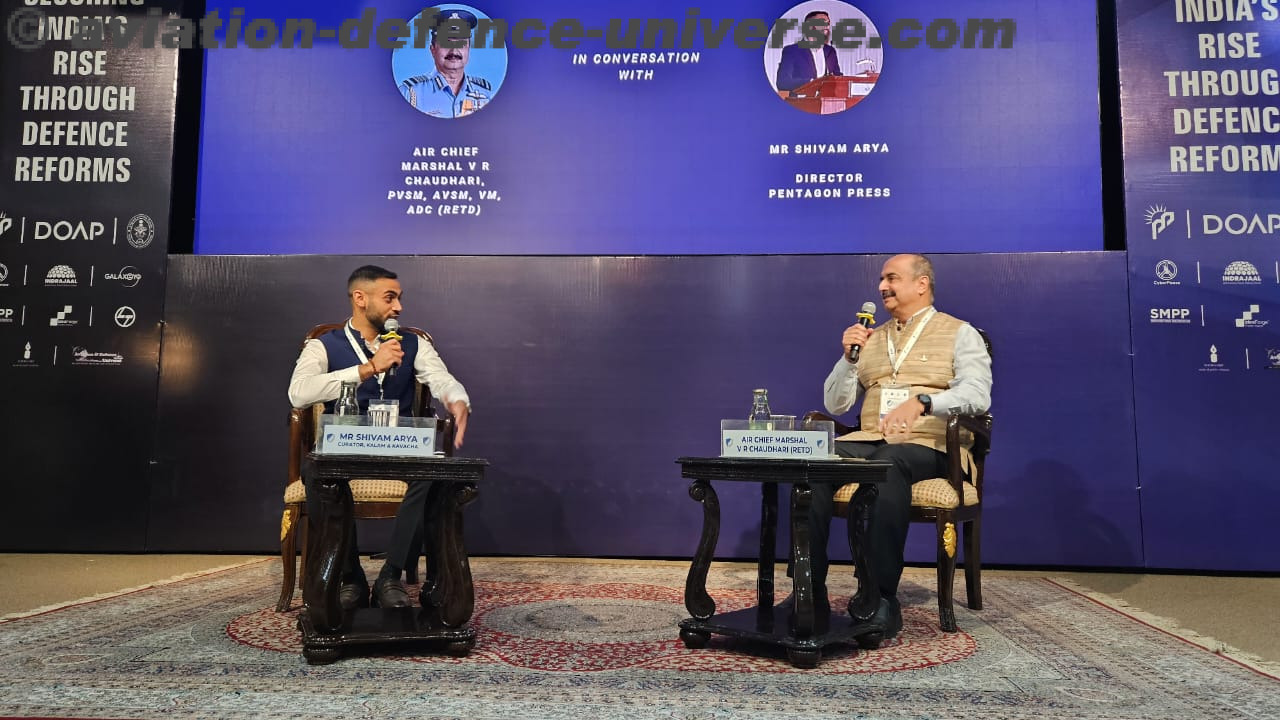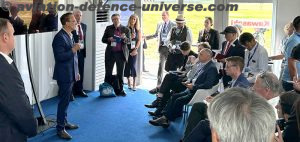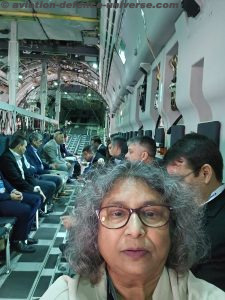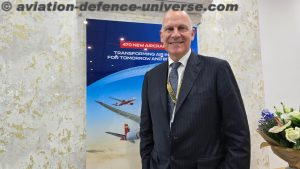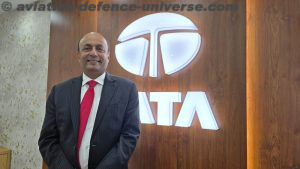- Boeing Commercial Airplanes CEO Focuses on Safety, Quality, and Predictability
- Boeing Defense and Space Highlights Mission Advantage Strategies
- Boeing Global Services Chief Emphasizes Comprehensive and Global Reach
By Sangeeta Saxena
Farnborough, UK. 25 July 2024. It was a powerful presidential panel of the aviation major Boeing a day prior the start of the Farnborough Airshow 2024. Stephanie Pope, CEO of Boeing Commercial Airplanes (BCA), Theodore Colbert III, President and CEO of Boeing Defense, Space & Security (BDS) and Chris Raymond, President and CEO of Boeing Global Services (BGS) met a select group of journalists at JW Marriot Hotel in London and not only spoke but also answered the queries put forth by the media present. The panel was moderated by Mike Friedman of Boeing communications.
 Stephanie Pope, CEO of Boeing Commercial Airplanes (BCA), outlined her three main priorities after spending four months in her role: safety and quality, predictable deliveries, and fostering a strong culture. Pope stated that she had developed a comprehensive safety and quality plan based on extensive feedback from employees, customers, and regulators. The plan includes increased investment in training, simplifying business processes, reducing defects across the supply chain and factories, and deploying a Safety Management System (SMS) company-wide. To achieve predictable deliveries, the factories have been slowed down to implement these changes effectively. Pope emphasized that safety, quality, and schedule commitments must be met simultaneously, without compromising on any of these aspects. She aims to create a ‘just culture’ where leadership ensures employees have the necessary tools and training, and employees are responsible for following processes and speaking up about safety issues. This culture of engagement, empowerment, and accountability is showing early positive results, particularly in the 737 and 787 production lines. The same safety and quality measures are being implemented across all factories.
Stephanie Pope, CEO of Boeing Commercial Airplanes (BCA), outlined her three main priorities after spending four months in her role: safety and quality, predictable deliveries, and fostering a strong culture. Pope stated that she had developed a comprehensive safety and quality plan based on extensive feedback from employees, customers, and regulators. The plan includes increased investment in training, simplifying business processes, reducing defects across the supply chain and factories, and deploying a Safety Management System (SMS) company-wide. To achieve predictable deliveries, the factories have been slowed down to implement these changes effectively. Pope emphasized that safety, quality, and schedule commitments must be met simultaneously, without compromising on any of these aspects. She aims to create a ‘just culture’ where leadership ensures employees have the necessary tools and training, and employees are responsible for following processes and speaking up about safety issues. This culture of engagement, empowerment, and accountability is showing early positive results, particularly in the 737 and 787 production lines. The same safety and quality measures are being implemented across all factories.
BCA has prioritized improving its safety and quality standards. This includes implementing rigorous oversight, enhancing training programs, and investing in safety management systems (SMS) to prevent future issues. The OEM has taken steps to improve transparency with regulators, customers, and the public. Open communication about challenges, progress, and safety measures is critical to rebuilding trust.
She informed , “ FAA is very engaged. They are in our factories every day. They’re very firm and fair. And they’re working to make sure that we’re executing that plan. I think the administrator has been very clear, the safety and quality plan is our plan. And their role is oversight and ensuring we execute that. And this plan is not a three month plan. I call it transformational because some of these actions will take years. And so we are starting and prioritizing the top safety and quality items. And then we’ll work through all of our factories, all of our programs in a very deliberate way. But that will take time. Our employees are engaged, our employees are active, our employees want to be involved I go back to I am inspired and motivated every day from engaging with the folks on the floor. Our teams have dedicated their careers to designing and developing and building the world’s most advanced efficient products. And they take a lot of pride in that. And they take a lot of pride in that based on the foundation of safety and quality. And so this engagement momentum, it’s not a moment. It’s making sure every employee is empowered to speak up when they need help, or they see a way of things being done better. And my mission is to make sure they are heard, and they are valued, and they’re respected and they see action being taken.”
 As the discussion developed it was Theodore Colbert President & CEO at Boeing Defense, Space & Security (BDS), who reiterated that they were focused on safety, quality, and stabilizing our production programs. Their mission is to deliver decisive mission advantage to the customers through global control, reach, and strike capabilities. This involves data fusion and decision-making capabilities to maintain battlefield superiority. Programs like MQ-25 and KC-46 ensure that products can reach anywhere in the world efficiently. And delivering superior fighting power through the fighters and vertical lift capabilities is also a major focus.
As the discussion developed it was Theodore Colbert President & CEO at Boeing Defense, Space & Security (BDS), who reiterated that they were focused on safety, quality, and stabilizing our production programs. Their mission is to deliver decisive mission advantage to the customers through global control, reach, and strike capabilities. This involves data fusion and decision-making capabilities to maintain battlefield superiority. Programs like MQ-25 and KC-46 ensure that products can reach anywhere in the world efficiently. And delivering superior fighting power through the fighters and vertical lift capabilities is also a major focus.
“We are also addressing challenges with our fixed-price development programs and driving stability in our production processes. Despite these challenges, we remain committed to delivering for our customers every day. This focus on delivering decisive mission advantage is about delivering the capabilities and products through BDS that support it focus on global control, global reach and global strike today, and in the future, those three areas are so important to meeting the challenges that our customers have to meet relative to their adversaries. Control is about getting data in the right place at the right time. It’s about sensing. It’s about data fusion, and delivering decision making to our customers in a way that is faster than the adversary and allows them to control the battlefield. Reach is about reducing the tyranny of war, getting our products to where they need to and other products to where they need to around the world to do what they need to do,” stated Colbert.
Boeing Global Services has established itself as a crucial component of Boeing’s overall business strategy, offering a comprehensive range of services that support both commercial and defense customers. While facing challenges related to market competition, integration, and supply chain disruptions, BGS is actively working to enhance its reputation through quality improvement, digital innovation, and customer-centric approaches. As the aerospace industry continues to evolve, BGS aims to solidify its position as a trusted and reliable partner in the global aviation market.
 Chris Raymond, President and CEO of Boeing Global Services (BGS) informed the journalists present that at Boeing Global Services (BGS), the mission is to keep the world’s fleets flying safely, efficiently, and sustainably. They provide a comprehensive range of services including parts and distribution, aircraft modifications, maintenance, cabin products, training, and digital solutions. Their aim to be first skilled and trusted which means that their people are experts and trusted by the customers to make the right decisions. Secondly they aim to be comprehensive meaning that they leverage the broad portfolio and OEM expertise to provide integrated solutions
Chris Raymond, President and CEO of Boeing Global Services (BGS) informed the journalists present that at Boeing Global Services (BGS), the mission is to keep the world’s fleets flying safely, efficiently, and sustainably. They provide a comprehensive range of services including parts and distribution, aircraft modifications, maintenance, cabin products, training, and digital solutions. Their aim to be first skilled and trusted which means that their people are experts and trusted by the customers to make the right decisions. Secondly they aim to be comprehensive meaning that they leverage the broad portfolio and OEM expertise to provide integrated solutions
He added, “ I think our supply chain leaders deserve a lot of credit. There focus is on- Do we ship and store it somewhere else? Try to keep the inventory levels right for the ramp up liquidity issues that we were dealing with coming out of COVID and who might need liquidities help or you know, advance payments or things like that to manipulate the payment profiles to help with liquidity. And they’ve done that through a very difficult timeframe. And then I think our engineering team has put even more focus now we have a dedicated engineering leader that reports to the chief engineer of the company. And the whole focus of that team is to go work with suppliers. You know, whether that’s just a compliance issue like Stephanie said, or solving you know, a notice of escapement or more importantly, maybe solving yield problems, like how do we get the yield back into the system that lets us produce more of these things. They also lost some things to COVID. And we’re finding we have to go out and work now to together to how to get more production output in their factories as well. And so we’re doing all those things, but I credit our supply chain team pretty turbulent time, and they’ve done a great job.”
 Boeing Defense, Space & Security (BDS) has historically been a key player in the defense and aerospace sectors, with a reputation built on delivering advanced technology and critical capabilities to the military, space agencies, and other government clients. Boeing has a long history of successful defense and space programs, including iconic products like the F/A-18 Super Hornet, the Apache and Chinook helicopters, the F-15 fighter which has been roaring at RIAT and Farnborough and the International Space Station (ISS). These programs have established Boeing as a reliable partner for complex and mission-critical projects.
Boeing Defense, Space & Security (BDS) has historically been a key player in the defense and aerospace sectors, with a reputation built on delivering advanced technology and critical capabilities to the military, space agencies, and other government clients. Boeing has a long history of successful defense and space programs, including iconic products like the F/A-18 Super Hornet, the Apache and Chinook helicopters, the F-15 fighter which has been roaring at RIAT and Farnborough and the International Space Station (ISS). These programs have established Boeing as a reliable partner for complex and mission-critical projects.
Ted Colbert stressed that they still challenged with their big fixed price development programs, and driving stability into the production programs. “We had a good start to the year but this quarter, you’ll see to be significantly challenged, it’ll look like it looked third quarter of last year, as we go through some more challenges on the fixed price development programs. In both cases, we put a ton of work in place to drive stability, investing in our workforce, investing in our facilities and our processes and people in technology, making sure that we stay connected to our customers every day. And as I mentioned before, our whole focus on starting every next contract, right? Using reality and the basis of those contracts, negotiating around those contracts with transparency with our customers and beginning them right and starting in a way that makes sure that they’re successful in the future. And so, so as I said, this quarter will look a little bit like third quarter of last year. That notwithstanding, we remain committed to delivering to our customers every day. And I believe that the actions that we put in place to both stabilize our production programs and get our development programs into production are beginning to work, it will just take some time for them to manifest in our financial results over time. So with that, I’ll stop. And again, just finish on our team is, is so committed to delivering to our customer and our commitment to our customers, and our mission, and we just get better every single day,” he informed.
Boeing, once the undisputed leader in the aviation market, has faced significant reputational challenges in recent years. These challenges stem from several high-profile issues that have affected the company’s standing among customers, regulators, and the public.
 Stephanie Pope ended on the most motivating and positive note, “ As I said, I believe that Boeing is the greatest company in the world because of its people. And I believe that, and I believe in the plans we’re putting in place today, because they’re built on the feedback of our people. Our recovery and innovation is built on the strength of our people. It’s because of that, that I am committed to getting an agreement that serves both our people, and the needs of our employees while balancing the realities of our business. That is our focus in this negotiation. And that is my personal focus and engagement.”
Stephanie Pope ended on the most motivating and positive note, “ As I said, I believe that Boeing is the greatest company in the world because of its people. And I believe that, and I believe in the plans we’re putting in place today, because they’re built on the feedback of our people. Our recovery and innovation is built on the strength of our people. It’s because of that, that I am committed to getting an agreement that serves both our people, and the needs of our employees while balancing the realities of our business. That is our focus in this negotiation. And that is my personal focus and engagement.”
At the eve of Farnborough Air Show, Boeing executives Stephanie Pope, Ted Colbert, and Chris Raymond outlined their strategic priorities and ongoing efforts across their respective divisions. Stephanie Pope emphasized safety, quality, and predictability in Boeing Commercial Airplanes. Ted Colbert highlighted Boeing Defense, Space & Security’s focus on delivering decisive mission advantages through global control, reach, and strike capabilities. Chris Raymond discussed Boeing Global Services’ mission to keep fleets flying safely and efficiently, emphasizing skilled personnel, comprehensive services, and global reach.
All pictures are File Pics of ADU .












